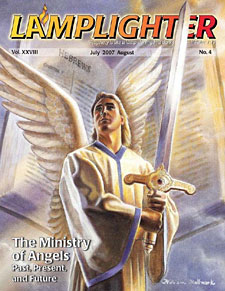The Angel of the Lord
His Identity, Manifestations, and Roles

Several years ago I received a letter from a fellow in Champaign, Illinois in which he asked me a number of very thought provoking questions about Jesus before He became incarnate in the flesh. Since that time, a number of other people have contacted me with a variety of questions concerning the same subject. Listed below are the questions and my responses to them.
Questions and Answers
Question: Did Jesus make appearances before His incarnation?
Answer: Definitely. A good example is found in Isaiah 6. King Uzziah, who had reigned for 52 years in Judah, had just died, and Isaiah, who was probably only a teenager at the time, went to the Temple to mourn the king’s death.
Isaiah was surprised by a vision in which he saw the Lord — the King of kings — “sitting on a throne, lofty and exalted” (Isaiah 6:1). In John 12:41 we are told that what Isaiah saw was Jesus in “His glory” — the glory He had before He became incarnate (Philippians 2:5-8).
Question: I have heard that “the Angel of the Lord” who is often referred to in the Old Testament was really Jesus making preincarnate appearances. Is this true?
Answer: “The Angel of the Lord” is referred to 56 times in 51 verses in the Hebrew Scriptures. The first reference is found in Genesis 16:7-12 where it says that “the Angel of the Lord” appeared to Hagar as she was fleeing in the wilderness from the rage of Abraham’s wife. The Angel told her to go back home, and then He revealed to her that she was pregnant with a son whose name would be called Ishmael.
A study of the subsequent appearances of the Angel of the Lord makes it very clear that they were pre-incarnate appearances of Jesus.
A good example is found in Exodus 3. There we are told that the Angel of the Lord appeared to Moses in the burning bush (verse 2). Then we are later told that the Angel spoke to Moses and said, “I am the God of your father, the God of Abraham, the God of Isaac, and the God of Jacob” (verse 6).
In Exodus 23 we are told that God the Father spoke to Moses and said He would send an angel to guide and protect the Children of Israel in the Wilderness. He refers to this angel as “My angel” and states that “My name is in Him” (Exodus 23:20-23). This is obviously no ordinary angel.
In Judges 13 we are told that the Angel of the Lord appeared to Manoah and his wife to inform them that they would have a child named Samson. When Manoah asked the Angel for His name, He replied, “Why do you ask my name, seeing it is wonderful?” (Judges 13:18). Manoah got the point of this statement immediately, for he turned to his wife and said, “We shall surely die, for we have seen God” (Judges 13:22).
The Angel’s deity is also attested to by the fact that on two occasions He accepted worship. When He appeared to both Moses (Exodus 3:1-5) and Joshua (Joshua 5:14-15), they were told to remove their sandals for they were “standing on holy ground.”
Question: But couldn’t these appearances of God in the form of “the Angel of the Lord” have been God the Father Himself instead of Jesus?
Answer: No, because there are many reports of people seeing the Angel of the Lord, and John 1:18 says, “No one has seen God at any time.” The verse then continues to make a very important point: “The only begotten Son, who is in the bosom of the Father, He has declared Him [God].” Thus, according to John, the people in the Old Testament times who saw God really saw Jesus in a pre-incarnate form “declaring” God.
This conclusion is confirmed by a statement which God the Father made to Moses at Mt. Sinai: “You cannot see My face, for no one may see Me and live” (Exodus 33:20). Likewise, Paul states in 1 Timothy 6:16 that God the Father “dwells in inapproachable light whom no man has seen or can see.”
In Genesis 32 we are told that Jacob wrestled with a “Man” (verse 24) who identified Himself as God (verse 28). In fact, Jacob says, “I have seen God face to face…” (verse 30). Since we know from John 1:18 that no one has seen God the Father, Jacob must be talking about Jesus in a pre-incarnate appearance. This is made clear in Hosea 12:3-4 where we are told that the God-Man Jacob wrestled with was “the Angel.” In verse 5 Hosea identifies the Angel as “the Lord, the God of hosts.”
In Malachi 3:1, in a prophecy about the First Coming of the Messiah, God the Father is quoted as promising to send His Son: “Behold, I am going to send my messenger…” The word translated “messenger” is the Hebrew word, malakh, which literally means “angel.”
Further evidence that the Angel of the Lord was the preincarnate Jesus is the fact that the Angel ceased to appear after Jesus became incarnate in the flesh. At that point in time, the Angel Gabriel took over the responsibility of serving as God’s chief messenger.
Question: Does the title, “the Angel of the Lord,” mean that Jesus is a mighty angel like Gabriel or Michael?
Answer: Not at all. In fact, we are told point blank that Jesus is “much better than the angels” (Hebrews 1:4) because He is the one and only Son of the Father (Hebrews 1:1-5). Therefore, the angels worship Him (Hebrews 1:6-7). Also, the angels were created at a point in time (Psalm 148:1-6) whereas Jesus has existed eternally (John 1:1-14). In fact, the Bible asserts that Jesus Himself was the one who created the angels (Colossians 1:16).
Question: If Jesus is not an angel, then why was He given the title of “the Angel of the Lord” in His pre-incarnate appearances?
Answer: The title is both a term of endearment and a description of Jesus’ primary role in these appearances. Just as my wife is my “angel,” so also is the Son the Father’s “angel.” Jacob used this type of terminology when he blessed his sons on his death bed. In blessing Joseph, he referred to God as “the angel who has redeemed me from all evil” (Genesis 48:15-16).
Again, the term, angel, means “messenger.” And that is the role that Jesus most often played in His pre-incarnate appearances. Therefore, the title was most appropriate.
The imagery is carried over to the New Testament in a vision that John records in Revelation 10. John is given a flash-forward to the end of the Tribulation. He sees a “strong angel” coming down out of Heaven. The angel has the title deed of the earth in his hand. He puts one foot on land and the other in the sea and lifts the title deed in the air as a symbol of his claiming all of creation for himself.
I don’t think there is any doubt that this “angel” is Jesus. He is clothed in a cloud, crowned with a rainbow, and has a “face like the sun” — all of which are symbols of deity (see Revelation 1:13-17). His feet are like “pillars of fire,” indicating He has come in judgment — and all judgment has been given to Jesus (John 5: 22). Most important, He holds open in His hand the title deed of the earth (Revelation 10:2), a deed which we are told in Revelation 5:5-7 that only Jesus is worthy to open.
Some object to the identification of this angel as Jesus because He makes an oath by the name of God (Revelation 10:6). They ask, “How can God swear by God?” But in Hebrews 6:13 we are told that when God made His promises to Abraham that “He swore by Himself” because “He could swear by no one greater.” We see the same thing in Jeremiah 22:5 where God says, “I swear by Myself.”
It is only appropriate that the imagery of “the Angel of the Lord” should be used in the book of Revelation because it is a book steeped in the Hebrew Scriptures. Revelation contains over 300 quotes or references to Old Testament passages, more than any other New Testament book.
Question: What was the pre-incarnate name of Jesus? Could it possibly have been “Israel” in light of 2 Chronicles 7:14, Exodus 4:22, and Hosea 11:1?
2 Chronicles 7:14 — “[If] My people who are called by My name [will] humble themselves and pray…”
Exodus 4:22 — “Then you [Moses] shall say to Pharaoh, ‘Thus says the Lord, “Israel is My son, My first-born.”‘”
Hosea 11:1 — “When Israel was a youth I loved him, and out of Egypt I called My son.”
Answer: God the Father loves names because He is a personal God (1 Peter 5:7). He Himself has a personal name, Yahweh, which He revealed to Moses at the burning bush (Exodus 6:2-3). This name is used in the Hebrew Scriptures 6,668 times. Unfortunately, it is camouflaged in most English translations by the use of the word, LORD — all in capital letters.
During biblical times, God often changed the names of people as their roles would change. When He called the man who was to become the father of the Jewish people, He changed his name from Abram, meaning “exalted father,” to Abraham, meaning “father of a multitude” (Genesis 17:5). Likewise, He changed the name of Abraham’s wife from Sarai to Sarah, meaning “princess” (Genesis 17:15). When stubborn and deceiving Jacob finally yielded to the Lord, his name was changed to Israel, meaning “he who strives with God” (Genesis 32:28). In New Testament times, Saul’s name was changed to Paul, and Simon’s name to Peter (Acts 13:9 and Mark 3:16).
In Revelation 2:17 we are told that when the Redeemed stand before the judgment seat of Jesus, each one will be given a white stone (a symbol of innocence) on which will be written a new name. Yes, we are going to have new names in the Eternal State. These names will probably relate to our Christian lives. Thus, some may be named Faith, while others might be called Perseverance or Love.
Jesus’ name — Yeshua in Hebrew — means “the salvation of the Lord” (Matthew 1:21). His name expresses the purpose of His First Coming. We are told in Revelation 19:12 that when He returns to reign He will be given a new name. This name will undoubtedly relate to His new role as King of kings. Jeremiah 23:6 hints that His new name may be Yahweh-Tsidkenu, meaning “The Lord’s Righteousness.” That would be an appropriate name because He is returning to bring peace, righteousness and justice to this world.
Considering all these points, it certainly makes sense to assume that Jesus might have had some other name before He became incarnate. But what it may have been, the Bible does not reveal. “Angel of the Lord” is a title, not a name.
It certainly was not Israel because that name means “one who strives with the Lord.” How could that be the name of one who co-exists in perfect unity with God the Father? In fact, Jesus said that He and the Father are One (John 10:30).
In Exodus 4:22 God told Moses to say to Pharaoh, “Israel is my son, My first-born.” This phraseology was selected in order to emphasize to Pharaoh how important the Jewish people were to God. But it is a metaphor, similar to the New Testament concept that the Church is the Bride of Christ (Ephesians 5:25-26 and Revelation 19:7).
Hosea 11:1 quotes God the Father as saying, “When Israel was a youth, I loved him, and out of Egypt I called My son.” Again, the Lord is speaking metaphorically of Israel as His son, just as He refers to Israel elsewhere as His wife (see Jeremiah 3:1-5, Jeremiah 31:32, and Ezekiel 16:15-34).
In 2 Chronicles 7:14 God refers to Israel as “My people, which are called by My name.” Literally, this passage says, “My people over whom My name is called.” The point here is not that God’s name is Israel. Rather, the point is that the Jewish people are the people of Yahweh.
Question: What other roles did the Angel of the Lord fulfill besides that of a messenger?
Answer: Delivering messages was certainly His primary role. He appeared to the prophet Balaam and gave him orders (Numbers 22:22-35). He instructed Gideon to deliver Israel from the Midianites (Judges 6). He prophesied the birth of Samson (Judges 13), and He commanded David to build an altar in Jerusalem (1 Chronicles 21:18).
Sometimes He provided guidance. He led the Children of Israel in the wilderness as a pillar of cloud by day and fire by night (Exodus 14 and Judges 2:1). He directed Elijah when he fled to Mount Horeb (1 Kings 19).
Occasionally, He served as an avenger, executing judgment upon the enemies of Israel. When the Assyrians threatened to destroy Jerusalem, it was the Angel of the Lord who killed 185,000 of them in one night, forcing those remaining to retreat (2 Kings 19:35). In times like this, He also served as a protector of Israel and is lauded in the Psalms as such: “The angel of the Lord encamps around those who fear Him, and rescues them” (Psalm 34: 7).




